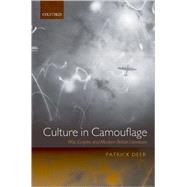
Note: Supplemental materials are not guaranteed with Rental or Used book purchases.
Purchase Benefits
What is included with this book?
| List of Illustrations | p. ix |
| Introduction | p. 1 |
| War culture and war literature | p. 4 |
| The Second World War culture boom | p. 9 |
| From the Panorama of Battle to the Labyrinth of Total War: British War Culture, 1914-1929 | p. 15 |
| 'I used to be able to visualize things': the Great War and modern vision | p. 15 |
| Recapturing the oversight of war | p. 19 |
| 'Forever England': war poetry and deathly vision | p. 25 |
| 'Thoughts by England given': war correspondents and propaganda | p. 32 |
| Modernism in camouflage | p. 43 |
| Ford Madox Ford's Parade's End and the recovery of strategic vision | p. 50 |
| The Empire of the Air: British Air Power and the Second World War | p. 61 |
| The air war and modern memory | p. 61 |
| From Lawrence of Arabia to Aircraftsman Ross: air power's imperial romance | p. 64 |
| The pleasures and terrors of the 'air-minded' | p. 73 |
| 'The Bombers alone provide the means to victory': the triumph of the aerial view of battle | p. 80 |
| From The Aerodrome to 'Airstrip One': Rex Warner and the empire of the air | p. 84 |
| Virginia Woolf's 'Thoughts on Peace' in an Air Raid | p. 91 |
| Aces and air marshalls: the air war in the eyes of its participants | p. 96 |
| Culture in the Blackout: Living through the Blitz, 1940-4 | p. 106 |
| Blackouts on the Imperial Home Front | p. 106 |
| 'Taking it' on the Home Front: Humphrey Jennings' imaginary war | p. 112 |
| Propaganda, Surveillance, and Secrecy | p. 119 |
| 'More like a film': Henry Green's visions of the Blitz | p. 123 |
| Listen to Britain: radio oracles of the people's war | p. 132 |
| 'Play unknown, actors unseen': James Hanley's No Directions | p. 141 |
| Ghosts inside the 'Island Fortress': Graham Greene, Elizabeth Bowen, and the Haunting of the Home Front | p. 151 |
| The haunting of the Home Front | p. 151 |
| 'At Home' in the Blitz: Graham Greene's Ministry of Fear | p. 155 |
| 'I cannot paint or photograph like this': Elizabeth Bowen's 'savage warnings' | p. 168 |
| 'Songs my father taught me': exhuming Deep England | p. 173 |
| 'It will have no literature': Ireland, spying, and surveillance | p. 180 |
| The 'saving hallucination': confronting the ghosts of war | p. 186 |
| 'Simplify Me When I'm Dead': The Battle over Memory and National Culture | p. 192 |
| 'When in a year collapse particular memories' | p. 192 |
| 'No letters please': the uses of poetry | p. 195 |
| 'Why not war writers?': the blackout within the war machine | p. 200 |
| 'Literature is common ground': Virginia Woolf outside the leaning tower | p. 201 |
| New puritans and word controllers: George Orwell's culture wars | p. 211 |
| Total Waugh: dandies and queer aesthetes on the Home Front | p. 218 |
| 'Outside your own field of vision': Alexander Baron and the radical view of battle | p. 224 |
| Conclusion: The Boom Ends: The War on British literature of the 1940s | p. 235 |
| Notes | p. 243 |
| Bibliography | p. 289 |
| Index | p. 313 |
| Table of Contents provided by Ingram. All Rights Reserved. |
The New copy of this book will include any supplemental materials advertised. Please check the title of the book to determine if it should include any access cards, study guides, lab manuals, CDs, etc.
The Used, Rental and eBook copies of this book are not guaranteed to include any supplemental materials. Typically, only the book itself is included. This is true even if the title states it includes any access cards, study guides, lab manuals, CDs, etc.